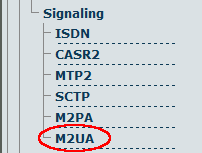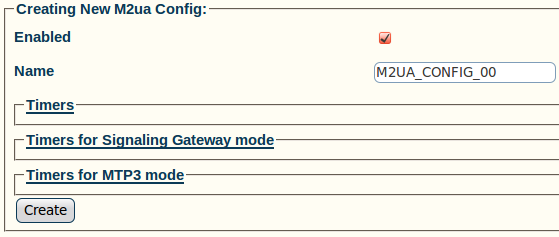Toolpack:Creating the M2UA Configuration A
From TBwiki
(Difference between revisions)
| (5 intermediate revisions by one user not shown) | |||
| Line 1: | Line 1: | ||
| + | === '''''Applies to version(s): v2.5, v2.6.''''' === | ||
| + | {{DISPLAYTITLE:Creating the M2UA Configuration}} | ||
To create your [[M2UA]] system, you must create a new M2UA configuration. | To create your [[M2UA]] system, you must create a new M2UA configuration. | ||
| − | + | M2UA (Message Transfer Part 2 User Adaptation Layer) is used to interface the [[MTP2 Layer]] of a signaling gateway to the [[MTP3 Layer]] of a media gateway controller (MGC). M2UA can also be seen as a way to extend an MTP2 link. An M2UA link is always bound to an MTP2 link. | |
To create an M2UA configuration: | To create an M2UA configuration: | ||
| Line 20: | Line 22: | ||
[[Image:Toolpack_v2.5_M2UA_Created.png]] | [[Image:Toolpack_v2.5_M2UA_Created.png]] | ||
| + | |||
| + | |||
| + | ==List of Parameters== | ||
| + | |||
| + | * [[Parameter: Name|Name]] | ||
Latest revision as of 13:45, 9 July 2012
Applies to version(s): v2.5, v2.6.
To create your M2UA system, you must create a new M2UA configuration.
M2UA (Message Transfer Part 2 User Adaptation Layer) is used to interface the MTP2 Layer of a signaling gateway to the MTP3 Layer of a media gateway controller (MGC). M2UA can also be seen as a way to extend an MTP2 link. An M2UA link is always bound to an MTP2 link.
To create an M2UA configuration:
1- Click M2UA in the navigation panel
2- Create the M2UA configuration:
- Enter a name for the M2UA service
- Click Create
3- Verify that the "M2ua Cfg was successfully created" message appears

